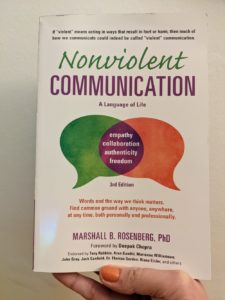Nonviolent Communication by Marshall B. Rosenberg, PhD
Written by Ashley Kelmore, Posted in Reviews
Best for:
People looking for a better, more empathetic, more effective way to communicate.
In a nutshell:
Rosenberg offers guidance for ways to be more effective in communicating and finding common ground.
Worth quoting:
“Most of the time when we use [the word should] with ourselves, we resist learning, because should implies that there is no choice.”
“…emotional liberation entails more than simply asserting our own needs.”
Why I chose it:
My partner read it and wanted me to take a look a well.
Review:
With this book, Rosenberg provides what I find to be a helpful communications structure for more empathetic and constructive engagement. I think it is at times way too stiff, and a bit naive, but I also can see a lot of value in it.
The main component of NVC (nonviolent communication) is a four-part process of communicating:
1 – Observe (but do not judge)
2 – Associate feelings with the observation (and actual feelings, not ‘I feel that you are being a jerk’)
3 – Identify what needs we have that are associated with those feelings
4 – Request what we want from the other person.
The book spends a chapter on each of those components, then looks at how to receive that type of communication, how to communicate that way with ourselves, and also how to provide more effective affirmations. I took quite a few notes, and I can definitely see how this all could work in real life.
Rosenberg shares many sample conversations and examples of its success in seemingly fraught situations (including discussions between Israelis and Palestinians), but some of the language feels like something out of a text book, not like how people really talk. Especially his approach of asking people to repeatedly reflect back what they have heard. I know that’s an ‘active listening’ approach as well, but I could see attempts to guess at what is beneath the language getting a bit annoying.
I do have some issues with the approach. For example, the discussion around anger. He sees anger as useful, but only insofar as identifying what needs of ours are not being met. Which is fine, but he doesn’t go further into what to do if we identify the need, the need is reasonable, and the person who can meet that need refuses. Think racism, misogyny, transphobia, etc. I get that there might be a point where communication just isn’t going to meet the need, but Rosenberg doesn’t seem to acknowledge that possibility.
He also sees no value in applying moralistic judgments (which he separates from value judgments, which for him are fine), and asks us to reframe such judgments into the person not acting in harmony with our needs. Again, I kind of get it – if the goal is to get the needs met, why not try what might work – but also, I do have moralistic judgments about some folks and their actions, and I think that’s reasonable because there are some actions that society should not accept or accommodate.
And as empathy is such a big part of this, he’s essentially asking the oppressed to empathize with their oppressors to the end of getting needs met, and I’m not sure that’s reasonable to ask of oppressed people. He is clear that ‘the process is designed for those of us who would like others to change and respond, but only if they choose to do so willingly and compassionately.’ Which, for some actions, I’d argue that change needs to happen regardless of whether the actor is doing it willingly.
That’s a lot of caveats, I realize, but I do overall like this approach and am looking at incorporating it into the ways I communicate with others (including my partner).
Recommend to a Friend / Keep / Donate it / Toss it:
Keep

